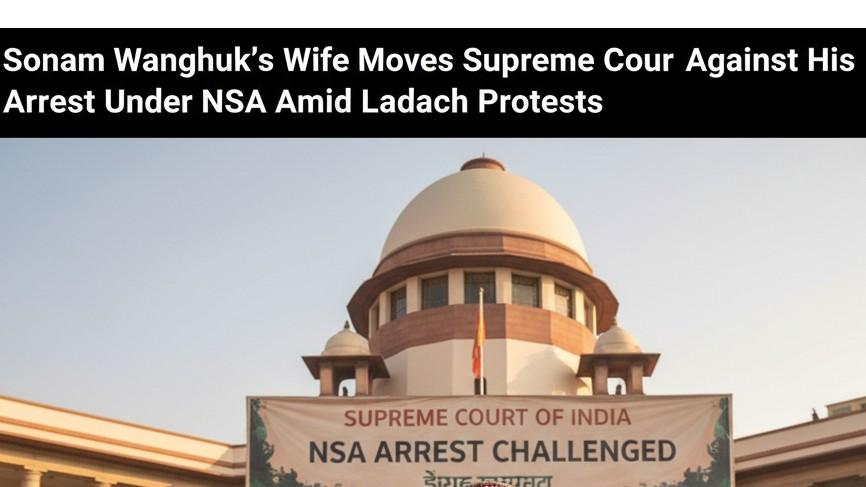Sonam Wangchuk’s wife moves the Supreme Court against his NSA arrest during the Ladakh protests, seeking release and challenging violations of due process.
The arrest of Ladakh-based climate activist and education reformer Sonam Wangchuk has sparked widespread debate across India, not just about democratic rights, but also about the region’s long-standing demand for constitutional safeguards. On October 3, 2025, his wife, Gitanjali Angmo, filed a petition in the Supreme Court of India, challenging his detention under the National Security Act (NSA). The case has become a flashpoint, combining the issues of civil liberties, environmental activism, and Ladakh’s political aspirations.
The Unfolding of Ladakh’s Protest Movement
Ladakh has been at the center of political turmoil since its separation from Jammu and Kashmir in 2019, when it was carved out as a Union Territory without a legislature. While many initially welcomed direct governance from New Delhi, dissatisfaction grew quickly as people realized the absence of statehood limited their decision-making powers.
In September 2025, protests gained momentum as groups demanded two major changes:
- Full statehood for Ladakh, ensuring greater self-governance.
- Inclusion under the Sixth Schedule of the Indian Constitution, which grants tribal and hill areas special protections over land, resources, and cultural practices.
The demonstrations escalated on September 24, when violent clashes broke out between protestors and security personnel. Tragically, four people lost their lives, and dozens were injured. The incident hardened the government’s stance and paved the way for stricter measures.
Why Sonam Wangchuk Was Arrested
Sonam Wangchuk, widely respected for his innovations in sustainable technology and education reforms, has long been an influential voice in Ladakh. He rose to international prominence for projects like the Ice Stupa artificial glaciers and has received global recognition for promoting eco-friendly solutions.
Authorities, however, accused him of making provocative statements that allegedly incited unrest. Soon after the violence, he was detained under the National Security Act, 1980, a law that allows preventive detention of individuals who are considered threats to national security or public order. Under this Act, a person can be held without formal charges or trial for up to a year.
Following his arrest, Wangchuk was moved from Ladakh to Jodhpur Central Jail in Rajasthan, raising further concerns about transparency and due process.
The Supreme Court Petition by Gitanjali Angmo
In response, Wangchuk’s wife, Gitanjali Angmo, filed a habeas corpus petition in the Supreme Court. A habeas corpus plea is one of the strongest legal remedies against unlawful detention, requiring the authorities to justify why an individual is being held.
Her petition argues:
- Violation of due process: Authorities did not follow the proper legal procedures before detaining him.
- Misuse of NSA: The Act, meant for extraordinary threats, is being misapplied against a peaceful activist.
- Fundamental rights violation: The detention infringes upon Wangchuk’s constitutional rights, including freedom of speech and personal liberty.
By approaching the Supreme Court directly, she has taken the matter to the highest judicial authority, seeking his immediate release. The Court’s decision could set an important precedent for the use of preventive detention laws in India.
Wider Implications of the Arrest
The detention of Sonam Wangchuk has larger implications beyond the individual case:
- For Ladakh’s Movement
His arrest has intensified feelings of alienation in Ladakh. Many locals believe that instead of addressing their genuine concerns—such as protection of land, environment, and culture—the government is silencing voices of dissent. - For Civil Liberties
The use of the NSA against a non-violent activist has raised alarms among human rights groups. Critics argue that preventive detention laws should be applied sparingly, and only in extreme circumstances, not against protest leaders or activists. - For Environmental Advocacy
Wangchuk has been an international advocate for climate action, especially in fragile Himalayan ecosystems. His arrest has drawn global attention, with many environmentalists urging the government to respect his contributions and engage with him rather than suppress him.
What Comes Next
The Supreme Court is expected to hear the petition soon. If the Court finds merit in Angmo’s arguments, it could order Wangchuk’s release or at least demand a review of the detention process. Meanwhile, protests in Ladakh continue, with many viewing the case as symbolic of the region’s larger struggle for dignity and self-determination.
The Union government, on the other hand, maintains that strong measures are necessary to maintain peace and prevent unrest from spiraling further.
FAQs: Sonam Wangchuk’s Wife Moves Supreme Court Against His Arrest Under NSA Amid Ladakh Protests
Who is Sonam Wangchuk?
He is a Ladakh-based engineer, educator, and climate activist, best known for his sustainable innovations such as the Ice Stupa project and for advocating eco-friendly education reforms.
What is the National Security Act (NSA)?
Enacted in 1980, the NSA allows authorities to detain individuals preventively for up to a year without trial if they are considered threats to security or public order.
What does Gitanjali Angmo’s petition seek?
She has filed a habeas corpus plea in the Supreme Court, asking for her husband’s immediate release, alleging his arrest is illegal and unconstitutional.
What does Gitanjali Angmo’s petition seek?
She has filed a habeas corpus plea in the Supreme Court, asking for her husband’s immediate release, alleging his arrest is illegal and unconstitutional.
Conclusion
The case of Sonam Wangchuk highlights the deep tensions in Ladakh—between aspirations for autonomy, environmental concerns, and national security policies. As the Supreme Court reviews his detention, the nation watches closely. Whether his wife’s plea will secure his release remains uncertain, but the issue has already ignited a larger conversation on democracy, rights, and governance in one of India’s most fragile and strategically important regions.

























